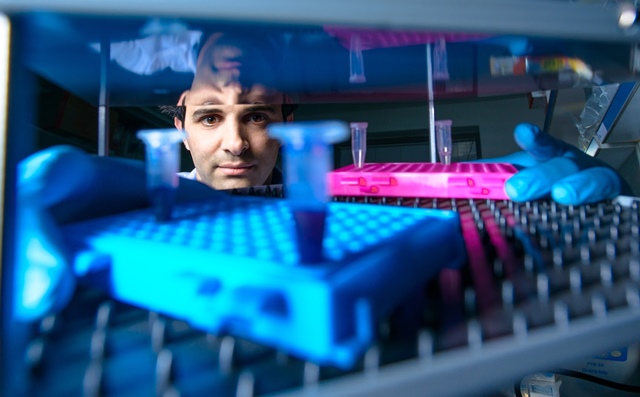Dr. Moshe Elkabets of the Shraga Segal Department of Microbiology and Immunology at BGU’s Faculty of Health Sciences was recently informed that he is the recipient of this year’s Teva Founders Award. The substantial award is in addition to the grant he received from the Israel Science Foundation (ISF) in October 2016.

Dr. Elkabets, whose research focuses on developing new treatments for head and neck cancer was raised in the Negev and is a BGU graduate. He completed his post-doctoral studies at Harvard in Boston, and Memorial Sloan Kettering Cancer Center in New York.
Dr. Elkabets is a highly talented and able researcher. In addition to being lead author on three articles published during his master’s and doctoral studies, he published three more articles as lead author in leading cancer journals during post-doctoral studies. His recent research findings have received international acclaim and led to a greater understanding of the relationship between the genomic structure of cancer cells and anticancer treatments offered to the patient, resulting in changes in therapeutic indications of the use of PI3K inhibitors in clinical practice.
Dr. Elkabets underwent special training for many years in the Dr. José Baselga Lab at Memorial Sloan Kettering Cancer Center. He presently collaborates with Prof. Victor Novack, Head of the Clinical Research Center, as well asDr. Joshua Ben-Zion, Head of the Head and Neck Surgery Unit, both at Soroka University Medical Center.
The three colleagues are attempting to establish a unique tissue bank for patient with cancer of the head, neck and thyroid. This tissue bank, that would include clinical, genetic and molecular elements could well lead to a fundamental change in the coming years in the quality and quantity of research in the field of oncology and basic knowledge of head and neck cancer in Beer-Sheva in particular, and Israel in general. Dr. Elkabets has also established fruitful cooperation with other oncologists in Beilinson (Dr. Aron Popovtzer and Dr. Irit Ben-Aharon) and Tel-Hashomer (Sheba) Medical Centers.
Personalized medicine is particularly challenging because of the differences between the various medical centers. Dr. Elkabets’ research group is investigating the molecular level of the response of specific patients to targeted therapies such as Erbitux, for example, with the aim of improving response rates of patients. The interaction between head and neck clinicians and Elkabets’ lab members is necessary to examine specific research conjectures on the one hand and scanning dozens of possible drugs on the other. The research approach of his lab combining basic research based on clinical issues and questions and a direct and close connection with the attending physician, is an example of multidisciplinary research becoming a practical translation of basic research.
